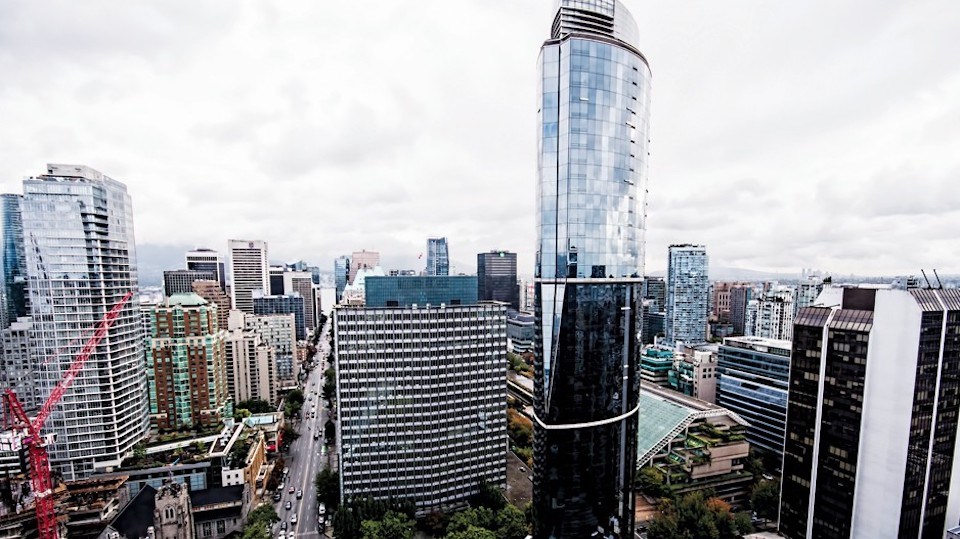Work-from-home is a stubborn trend that’s left downtown Vancouver in a “state of flux” after the pandemic rapidly shifted employee and employer expectations for the workplace, according to a new report from Avison Young (Canada) Inc.
The real estate services firm says the flight of tech companies from physical offices means the industry is responsible for 388,000 square feet, or 81 per cent, of all space available to sublease in downtown Vancouver. All other industries trail the tech sector by extraordinary margins with engineering coming up next at six per cent followed by mining at five per cent.
Avison Young found that small and medium-sized firms are now prioritizing operating cost-savings over the benefits of holding an office space.
But larger tech tenants have the financial backing to maintain their downtown offices while also introducing working from home arrangements, according to the report.
There’s also the cold reality of the types of leases these larger tech firms have signed. The Avison Young report found many of these leases within newly built buildings are too long and too expensive to be taken up by other firms that can’t match those financial commitments.
“For industries like tech, it makes sense to work from home. Those companies that have gone 100 per cent remote and committed to that, what they're doing now is they're starting to hire across time zones and that's really supporting their business,” Shauna Moran, founder and managing director of Operate Remote Coaching Ltd., told BIV.
Her Vancouver-based firm specializes in helping corporate leaders manage their remote and hybrid teams.
“Most people want some level of flexibility. They don't want to have to commute, especially if they've moved out of cities over the last few years,” Moran said.
The Avison Young report found some larger tech companies like Electronic Arts Inc. and SkyBox Studios, the latter of which is owned by Microsoft Corp. have been expanding in Burnaby.
“Notwithstanding this renewed interest in the suburbs, many larger technology tenants are also continuing, and in some cases growing, their presence within downtown,” the report stated, noting Amazon.com Inc. is due to occupy another 1.1 million square feet of office space at The Post building on 349 West Georgia Street beginning next year and Microsoft will be expanding by 400,000 square feet at the B6 building at 1090 East Pender Street in 2023.
But Amazon began laying off thousands of employees across its global workforce last week, including some in Vancouver, and CEO Andy Jassy has warned more cuts were coming in 2023.
Facebook’s parent company, Meta Platforms Inc. occupies 34,000 square feet of downtown office space at Waterfront Centre at 200 Burrard St. The tech giant has also been laying off workers across the globe by the thousands this month.
“Only time will tell whether the larger technology tenants, who are increasingly reducing their expenses, will also attempt to sublease their spaces or instead decide to remain committed to the [central business district],” the report stated.
Downtown Vancouver is experiencing just 43 per cent of the visits it had prior to the pandemic, according to a July report released by the University of California, Berkley’s Institute of Governmental Studies.
That level of activity was low enough to rank it No. 57 out of the 62 North American downtowns examined.
Researchers used cellphone pings from 18 million smartphones across the continent between March 2020 and May 2022 to measure how much activity was returning to urban centres.
Downtown Van, formerly the Downtown Vancouver Business Improvement Association, has also used cellphone data to measure downtown activity. President and CEO Nolan Marshall III said this type of data can have significant limitations when comparing American and Canadian cities, owing to the latter’s stricter privacy laws.
“My experience talking to colleagues, my experience visiting other places, just runs completely counter to where I think that report ultimately had Vancouver ranked,” he told BIV in August.
Marshall said problems also arise depending on how one defines a visitor when using cellphone data to judge how active an area is.
Vancouver’s downtown peninsula is one of the most densely populated areas in Canada and the U.S.
“If you draw your data collection map across the entire downtown, you're not identifying people who live within the area as a visitor,” Marshall said, “which is why we only do our cellphone data collection around our retail districts, and specifically so we can track how many people are going into those retail districts since they don't have as many residents as the rest of downtown.”



